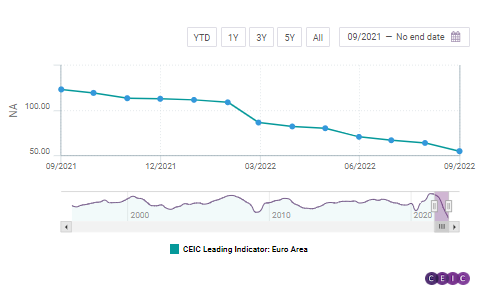CEIC Leading Indicator: Euro Area is on a clear path to recession


Euro Area's economy will most certainly fall into recession in the coming months, as the CEIC Leading Indicator declined to yet another all-time low (54.57) in September, which is significantly below the long-term trend at the neutral 100-mark. Moreover, it has been declining for 14 months straight. According to the CEIC Leading Indicator's methodology, if the indicator has been declining for longer than six months and falls below the long-term trend, it can be expected that an economic downturn would occur in the near future.

The common currency union is faced with accelerating inflation, which reached 10% y/y in September according to the flash Eurostat figures. Equity markets exhibit elevated uncertainty, as the Euro STOXX index down by 23.9% since the beginning of the year. Businesses and households alike are concerned among the upcoming winter, as Russia's invasion in Ukraine and the subsequent sanctions disrupted energy imports from Russia, which multiple member states depend on, Germany in particular. At the same time, ECB's measures to combat inflation by raising interest rates, might put the brakes on economic growth. Industrial and construction sentiment are both deteriorating, consumers are expecting difficult financial situation over the next 12 months. Euro Area's labour market stands out as a counterweight, as unemployment stays at a record low level and the PMI sub-indicator also pointing to an expansion.
Explore more visuals here.
Read more in the quarterly report Euro Area Economy in a Snapshot - Q3 2022.